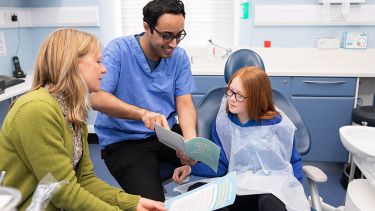Our research

The problem
Dental anxiety is common among children and young people. This has significant long and short term impact on the children, their families and dental care professionals.
Children with dental anxiety often avoid or delay dental care due to their fear, which can lead to an increased prevalence of untreated and decayed teeth, this may ultimately lead to discomfort and a reduced quality of life. Until recently, dental anxiety has been managed using techniques such as sedation or general anaesthetic. However, these approaches are costly for the NHS and only manage rather than reduce a child's anxiety.
I think children find it useful to see that other children have anxieties similar to their own.
Specialist registrar in paediatric dentistry
Our solution
In 2016 we conducted a study which aimed to provide a better way of managing dental anxiety in children. We identified Cognitive Behavioural Therapy (CBT) as a solution. This well established approach is a goal oriented therapy which aims to help people manage their problems by changing how they think and behave to a problem. It provides an alternative option to sedation or general anaesthesia as it reduces the problem rather than supplying a short term solution.
This was followed by a study to assess the feasibility of using a CBT approach to help children who were worried about visiting the dentist, or having treatment. The study provided evidence that a self-help CBT resource for young people with dental anxiety could be effective at reducing dental anxiety and its consequences. Both the young people and their parents thought the resource was a great asset. Dental professionals also found the guide, 'Your teeth you are in control', and the CBT approach to be very helpful.
The Five Areas model of CBT focuses on the patient’s life situation, altered thinking, altered behaviour, altered emotions and altered physical symptoms associated with their anxiety. It is a model of CBT that has been used to inform a series of self-help resources for patients with a variety of common mental health problems, including our resources for children with dental anxiety.
The CALM trial
CALM is a research project investigating ways to reduce children’s fear of the dentist. CALM is being carried out by researchers (from universities in Sheffield, Cardiff, Leeds, Newcastle, London and York) with help from children, parents, dental professionals and patient representatives.
Our key publications
These papers show the translation of our research, from realising the problem through to developing a useful solution.
-
Development and testing of a cognitive behavioural therapy resource for children.
This paper reports on the development of our low-intensity CBT resource 'Your teeth you are in control' for dental professionals to use with young people and their parents. The development involved a person-based approach involving interviews and focus groups with children, parents, and dental professionals to ensure that we got both the content and wording of the resource just right. We then tested the resource with 48 young patients and found that dental anxiety scores were reduced in 95% of patients, and children rated their quality of life as improved.
-
Children's experiences following a CBT intervention to reduce dental anxiety: one year on.
This paper reports on a follow up of 22 children after 12-18 months following their use of our CBT resource. We found that 91% of the children felt less worried about visiting the dentist than previously, and described positive changes in their beliefs, feelings and behaviours which allowed them to manage their dental anxiety better.
-
Development and evaluation of the children's experiences of dental anxiety measure.
As part of our research we decided to develop a new way to measure children's dental anxiety which was based on what children actually told us in our interviews. This measure - the children's experiences of dental anxiety measure - is called CEDAM. The CEDAM assesses the thoughts, behaviours, physical symptoms and feelings experienced by children when visiting the dentist. Our results show that the CEDAM could be used to monitor children’s dental anxiety and changes in dental anxiety that occur over time or following clinical or psychological interventions.
-
Children's experiences of dental anxiety.
This paper reports on the initial step in our research for the 'Your teeth you are in control' resource, which was to explore children's experiences of dental anxiety. The study was one of the first to actually ask young people themselves about their dental anxiety.
